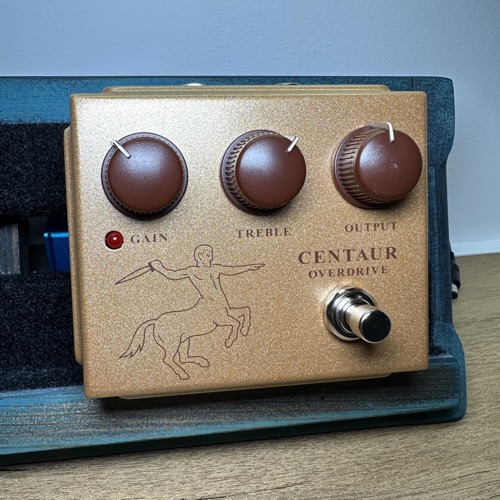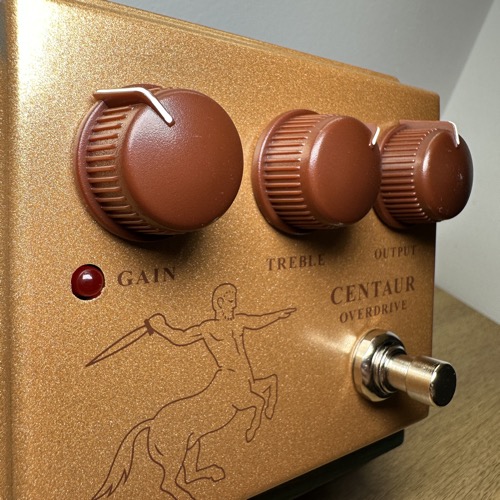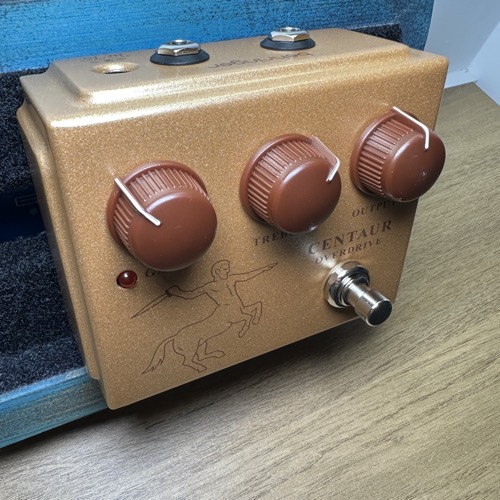
Behringer Centaur Overdrive Pedal Review – Could this be the BEST affordable Klon?
Introduction
The Klon pedal has a unique way of always staying relevant, and Behringer might have just given it another boost! Introducing the Behringer Centaur Overdrive Pedal: an affordable Klon clone crafted by the masters of replication themselves. This time, Behringer takes a step up from their typical £20 plastic-housed pedals.
The Centaur is encased in a sturdy, full-metal housing with a custom design, featuring the legendary “transparent” overdrive circuit inside. It mirrors the iconic Klon with the same look, the same controls, and—hopefully—the same sound! But is it any good? Is it worth the budget-friendly price? And does it stack up against other Klon clones—or even the original itself?
Let’s dive in and find out! We’ll explore the controls, the backstory, and why this pedal (along with a few others) represents a significant leap forward for Behringer. Could this be your new go-to overdrive pedal, or is it just another overhyped release? So, what exactly is the Behringer Centaur? Let’s break it down.
Behringer Centaur Overdrive
To put it simply, it’s a Klon clone! It’s a replica of the famous Klon circuit in a smaller and more affordable package. The Behringer Centaur Overdrive is an overdrive pedal based on the legendary Klon overdrive pedal—a pedal that, by now, you should all know about or have at least heard of! This is also one of the pedals from Behringer’s new range, inspired by classic designs.
Controls and options
Control-wise, it’s identical to a standard Klon. There are three knobs, which go (from the left): Gain, to control the amount of “magical” clipping and blend it with the clean signal; Treble, which remains neutral at 12 o’clock but boosts treble when turned right and cuts it when turned left; and Output, which adjusts the final volume of the pedal. At the bottom, you’ll find a soft-touch footswitch to toggle the pedal on and off. The pedal also features a buffered bypass, meaning that even when it’s off, the signal runs through the circuit, subtly affecting your tone and helping to preserve high-end frequencies—just like the original Klon.
The Behringer Centaur Overdrive has top-mounted jacks and runs on either a 9V power supply (100mA) or a 9V battery. There’s no need for any adapters or converters to use this pedal. You can purchase the Behringer Centaur Overdrive for just £54 at the link below, making it a real bargain! However, be quick, as it tends to sell out very quickly.
The Sounds
For the demo sounds, we did what most people do when demoing a Klon: we used it to push an amp ever so slightly, showcasing how most players typically use a Klon. However, we also used it with a pair of humbuckers, setting the gain slightly higher into a clean amp to demonstrate how great this pedal sounds as a standalone overdrive pedal. For some of the solos, we added the Boss SDE-3000D for delay.
After the demo songs, we ran through the variety of sounds this pedal can produce—ones you’ve likely heard many times before. We tested it with both single coils and humbuckers, running the amp in both clean and crunch settings. As always, the sound section features the pedal running straight into the front end of the Revv D20 (check out our review here).
What are my thoughts?
My first thought is that I love the look and design of this pedal. For the price, I think it’s finished exceptionally well. The golden shimmer paint job, case design, and decals are all spot on—a properly well-finished pedal. The same applies to the box! You get a decent box that is fully recyclable.
The first feature that stood out to me is the soft-touch footswitch. I wish more pedals had this! If you’re unfamiliar, soft-touch means the footswitch doesn’t click. While it might not seem like a big deal, it makes using the pedal much smoother and almost “comfier.”
"The Behringer Centaur Overdrive isn’t truly a “transparent” overdrive. Then again, I don’t believe the original Klon is entirely transparent either!"
Let’s Talk About the Sound
The biggest question you’re asking: does it sound like a Klon? Well, I’m not entirely sure—I’ve never played a real Klon! However, from what I’ve heard in online demos and from playing this pedal, I can’t tell much of a difference. It has that Klon sound!
The original Klon was designed to recreate the sound of an amp’s natural overdrive, and this pedal captures that quality beautifully. It has an amp-like tone and that classic mid-hump that helps guitarists cut through a mix. Because of this, the Behringer Centaur Overdrive isn’t truly a “transparent” overdrive. Then again, I don’t believe the original Klon is entirely transparent either!
There’s a surprising amount of gain available here, and pushing the Gain knob past 1 o’clock lets you really tap into that “magic” circuit. It delivers a thick, rich overdrive while remaining highly responsive to your guitar’s volume control. It’s especially effective at fattening up a Strat. On the other hand, if you turn the gain down and the volume up, it works wonderfully as a clean boost—the feature that made the Klon legendary.
My recommendation? Use it as a medium to heavy overdrive pedal. That’s where it shines! Set everything to 2 o’clock, and you’ll be thrilled with the tone. One thing I did notice is that the Treble control is set slightly lower than other Klon clones I’ve tried. By this, I mean you need to turn it up more than usual to achieve the expected high-end push.
The Price: A Total Steal
This pedal is an absolute bargain! A full-metal, custom casing at this price is hard to beat. While I’m aware that Behringer manufactures overseas and benefits from massive industry leverage, allowing them to keep costs down, that ultimately benefits us as players. Pedals like this wouldn’t be possible otherwise. Plus, the packaging is surprisingly nice for the price!
"I’m genuinely excited to see what Behringer puts out next!"
Minor Downsides
There is one thing I noticed: a slight lag when pressing the pedal on and off. It could be entirely in my head, but there seems to be a tiny delay. Another point worth mentioning is the pedal’s size. While it’s smaller than a standard Klon, the “mini Klon case” shape is still a bit awkward. It takes up more space on a pedalboard than you might expect. It’s not a dealbreaker, but it’s something to consider.
A Turning Point for Behringer
I think this pedal marks a huge turning point for Behringer and their guitar division. They’ve always been known for cloning other brands’ pedals and putting them in cheap plastic cases. Now, they’re releasing pedals like this, which are still clones but of pricier, sought-after designs. What’s more, they’ve upgraded to full-metal, custom casings.
I’m genuinely excited to see what Behringer puts out next!
Conclusion
So, that’s our review of the new Behringer Centaur Overdrive, their take on the classic Klon overdrive pedal. If you’re looking to explore the Klon sound but don’t want to spend too much, this is the perfect solution for you. I would highly recommend choosing this over a cheap Chinese clone, as it comes with a warranty, solid build quality, and the backing of a brand with years of experience. Honestly, I can’t think of a reason not to buy this pedal! If you’re after a Klon-style pedal in both sound and looks, this one is spot on.
Should we check out the Vibe, the Fuzz, or maybe even the Wah next? I’ve heard the Wah includes a boost control, making it potentially similar to the Slash Dunlop Wah. It could definitely be worth a closer look! Let us know your thoughts via our contact page or over on Instagram—we’d love to hear your opinions on this exciting new direction for Behringer.
A quick word of warning: when you go to purchase this pedal, you may find it’s sold out. However, don’t give in to resellers! Don’t pay more than retail for this pedal. It’s not a limited edition or a rare release, and Behringer will eventually catch up with the demand. Be patient, and you’ll get yours at the right price!
If you want to support the site then please give us a follow on Instagram and subscribe to our YouTube.
Behringer Centaur Overdrive Links:
- Website
- Buy the Behringer Centaur Overdrive (Andertons Affiliate Link)
- Buy the Behringer Centaur Overdrive (Thomann Affiliate Link)
Check out our other Articles here





5 thoughts on “Behringer Centaur Overdrive Pedal Review – Could this be the BEST affordable Klon?”
Comments are closed.